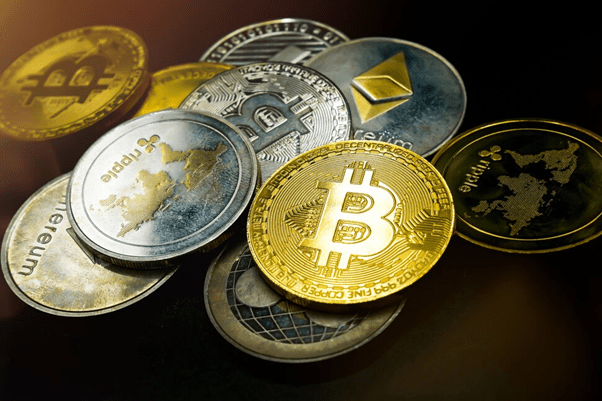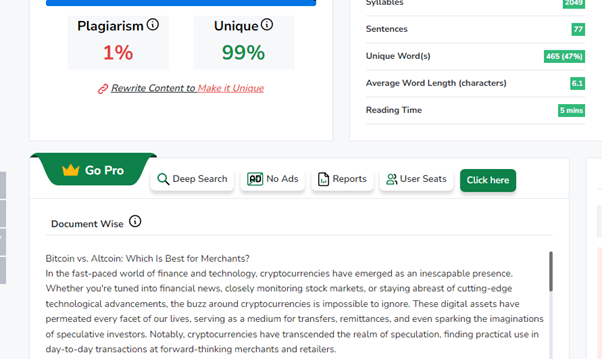Bitcoin and Altcoins Comparison: Key Differences Explained
Table of Contents
In the fast-paced world of finance and technology, cryptocurrencies have emerged as an inescapable presence. Whether you follow financial news, monitor stock markets closely, or stay updated on cutting-edge technological advancements, the buzz around cryptocurrencies is impossible to ignore. These digital assets have permeated every facet of our lives, serving as a medium for transfers, remittances, and even sparking the imaginations of speculative investors. Notably, cryptocurrencies have transcended the realm of speculation, finding practical use in day-to-day transactions at forward-thinking merchants and retailers. This makes the Bitcoin and Altcoins comparison increasingly relevant in today’s evolving financial landscape.
However, for small businesses navigating the ever-changing tides of customer preferences, two vital questions loom large: Which cryptocurrencies should you embrace for your business? And how can you seamlessly integrate them into your payment ecosystem? Bitcoin, the trailblazing pioneer of digital currencies, boasts widespread recognition and trust, making it the default choice for many. However, Altcoins, the diverse array of cryptocurrencies that followed Bitcoin, offer unique features and potential that you can’t ignore.
Whether you’re a seasoned cryptocurrency enthusiast or just embarking on this exciting path, our discussion on “Bitcoin vs. Altcoin: Which Is Best for Merchants?” promises to equip you with the knowledge and insights necessary to make informed decisions in this dynamic realm of digital payments.
Bitcoin vs. Altcoin: An Overview
Definitions
Bitcoin, often referred to as the pioneer of cryptocurrencies, is a decentralized digital currency that an anonymous entity known as Satoshi Nakamoto created in 2009. It operates on a peer-to-peer network, enabling users to make direct transactions without intermediaries like banks. People often abbreviate Bitcoin as BTC, and it is known for its role as a store of value and digital gold. The Bitcoin and Altcoins comparison highlights the differences in features and usage across various digital currencies.
Altcoin is a broad term that encompasses any cryptocurrency other than Bitcoin. It’s short for “alternative coin” and refers to the thousands of digital currencies that followed Bitcoin’s creation. Altcoins aim to offer variations or improvements upon Bitcoin’s technology, features, or use cases. Examples of popular altcoins include Ethereum (ETH), Ripple (XRP), and Litecoin (LTC).
Both Can Be Accepted and Used as payment methods
Bitcoin and Altcoins share a common trait—they can both be utilized as payment methods in various scenarios:
Bitcoin has gained widespread acceptance among merchants and businesses worldwide. It can be used to pay for goods and services, ranging from online retailers to physical stores. Major companies like Microsoft, AT&T, and Overstock.com accept Bitcoin as a form of payment. Additionally, Bitcoin ATMs enable users to convert their Bitcoin into cash or make purchases directly.
Altcoins have also carved out their niche in the payments landscape. Ethereum, for instance, is not only a cryptocurrency but also a platform for smart contracts and decentralized applications (DApps). Some DApps use Ethereum’s native cryptocurrency, Ether (ETH), for transactions within their ecosystems. Other altcoins like Ripple (XRP) focus on facilitating cross-border payments and remittances, making them attractive options for international transactions. The Bitcoin and Altcoins comparison shows how these alternatives provide unique features and potential that you can’t overlook.
Bitcoin and Altcoin Payment Services
Cryptocurrencies aim to reduce costs and increase the speed of financial transactions by eliminating the need for third-party intermediaries. However, the relatively new and complex nature of cryptocurrencies, combined with a lack of understanding among established merchants, has led to challenges in their widespread adoption. Many merchants are also inclined to convert any cryptocurrency they receive into fiat currency due to its familiarity and stability.
Despite the aspiration to decentralize finances and eliminate intermediaries, the reality is that third parties play a crucial role in facilitating cryptocurrency transactions during this transitional phase and making Bitcoin and altcoin payments accessible to a broader range of businesses.
Payment Gateway Providers
Payment gateway providers for cryptocurrencies like UniPayment serve a pivotal role in simplifying and enabling transactions involving Bitcoin and altcoins. Much like traditional credit card gateway providers, they act as intermediaries to facilitate cryptocurrency transactions for businesses.
Simplified Transactions: Cryptocurrency payment gateway providers streamline the process of accepting digital currencies. They handle the technical complexities, allowing businesses to accept Bitcoin and altcoin payments with ease.
Conversion to Preferred Currency: Many payment gateway providers offer the convenience of converting cryptocurrency payments into the currency of the merchant’s choice, typically fiat currency. This feature helps mitigate the impact of cryptocurrency price volatility.
Security and Trust: These providers prioritize security, employing robust encryption and fraud prevention measures to ensure the safety of transactions. This instills confidence in both merchants and customers.
Bitcoin vs. Altcoin: Which Is Best for Merchants?
Altcoins: Lower Transaction Fees & Transaction Speed
Altcoins, or alternative cryptocurrencies, frequently present a compelling advantage with significantly lower transaction fees when compared to Bitcoin. For instance, the average Bitcoin transaction fee ranges from $2 to $10. In contrast, altcoins like Ethereum and Litecoin offer fees often under $1 per transaction. This cost advantage appeals to merchants handling high-frequency transactions or microtransactions, where every penny saved matters.
Moreover, altcoins typically shine in terms of transaction speed. Bitcoin’s block confirmation time averages around 10 minutes, making it less suitable for time-sensitive transactions. In contrast, altcoins benefit from shorter block confirmation times. For instance, Ethereum’s average block confirmation time is roughly 15 seconds, and Litecoin’s is about 2.5 minutes. This rapid transaction processing can greatly benefit businesses requiring swift and efficient payment handling, ultimately enhancing customer satisfaction and facilitating a smoother payment experience.
Bitcoin: Brand recognition and high security
Bitcoin enjoys unmatched brand recognition within the cryptocurrency ecosystem. It’s a name that resonates with people worldwide and is often the first cryptocurrency that comes to mind. This widespread recognition can significantly benefit merchants, as customers are more likely to trust and engage with a payment method they are familiar with.
To put it into perspective, as of September 2021, Bitcoin represented around 40% of the total cryptocurrency market capitalization, which had a value of approximately $2 trillion. This highlights its dominant position and the trust it has garnered.
Furthermore, Bitcoin is renowned for its robust security features, primarily because it uses a highly secure blockchain network. Since its inception in 2009, the Bitcoin blockchain has remained uncompromised, enduring numerous security tests over the years. This impeccable track record in security reassures businesses that prioritize safeguarding their financial transactions and customer data.
This impeccable track record in security reassures businesses that prioritize safeguarding their financial transactions and customer data.
Since its inception in 2009, no one has compromised the Bitcoin blockchain, and it has weathered numerous security tests over the years. This impeccable track record in security reassures businesses that prioritize safeguarding their financial transactions and customer data.
But Altcoins offer high volatility
While Bitcoin offers stability and trust, many altcoins are characterized by high volatility. In a Bitcoin and Altcoins comparison, their prices can fluctuate significantly over short periods, posing both opportunities and risks for merchants.
As an example, consider Ethereum (ETH), one of the most well-known altcoins. In 2020, ETH’s price ranged from approximately $130 to $740, showcasing its volatility. Similarly, other altcoins like Ripple (XRP) and Litecoin (LTC) have experienced substantial price fluctuations, often driven by market sentiment and technological developments.
Businesses considering altcoins should prepare for sudden value swings, which could impact their profitability and financial stability. Careful risk assessment and mitigation strategies are essential when dealing with highly volatile altcoins.
Conclusion
In the ever-evolving landscape of cryptocurrencies, the choice between Bitcoin and altcoins for merchants is a nuanced decision. Each option comes with its set of advantages and considerations.
Bitcoin, with its unparalleled brand recognition, offers a sense of trust and legitimacy among customers. It’s backed by a highly secure blockchain network, reassuring businesses concerned about security. However, its stability might limit potential profitability in the Bitcoin and Altcoins comparison.
Altcoins, on the other hand, can provide lower transaction fees and faster confirmation times, catering to the needs of businesses with high transaction volumes. Yet, they also introduce higher volatility, posing both opportunities and risks.
Ultimately, the “best” choice depends on a business’s specific goals, customer demographics, and risk tolerance. By staying adaptable and well-informed in this rapidly evolving space, merchants can navigate the cryptocurrency landscape effectively and harness the benefits of digital currencies to meet the demands of the modern consumer.

